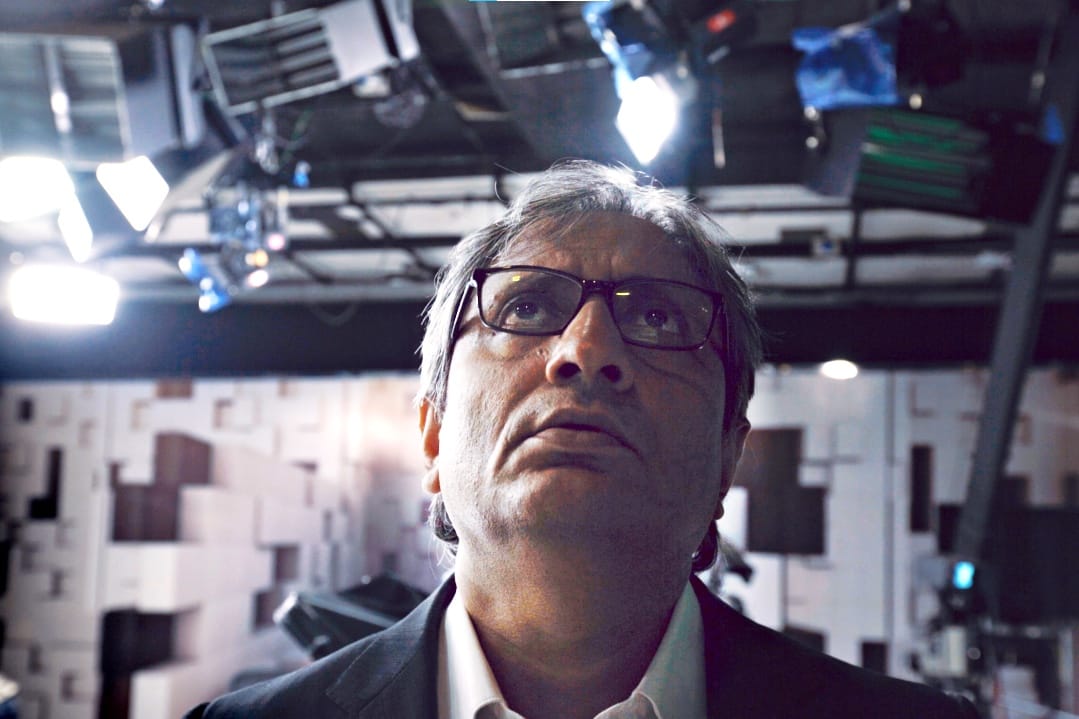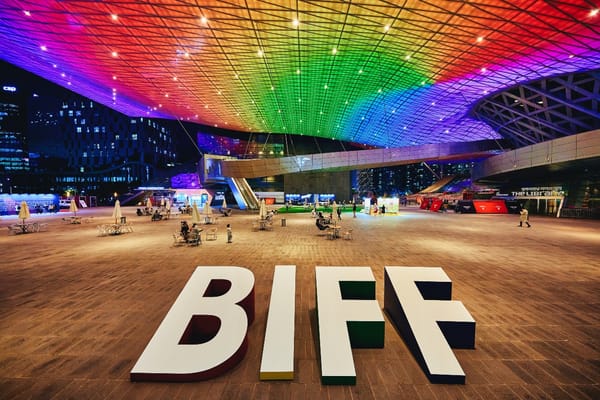Nadav Lapid controversy at IFFI Goa; Ravish Kumar resignation from NDTV

Two seemingly unrelated stories I reported on for Deadline this week reflect the worrying direction of travel in post-pandemic India.
On Monday evening, Berlin Golden Bear-winning filmmaker Nadav Lapid, head of the competition jury at the International Film Festival of India (IFFI) in Goa, stood alone on stage at the closing ceremony and became the little boy who shouted that the Emperor was not wearing any clothes.
While praising the other 14 films in competition, he described Vivek Agnihotri’s Hindi-language The Kashmir Files as "a propaganda, vulgar movie, inappropriate for an artistic competitive section of such a prestigious film festival". It was a shocking moment because how often have we sat through these butt-numbing ceremonies stuffed full of speeches from government officials where nothing remotely interesting is likely to happen.
The reaction on social media was swift and vitriolic – much was made of the fact that Lapid is Israeli, so should sympathise with the subject of the film, the exodus of Hindu Pandits from Kashmir following an insurgency in the 1990s, which was compared to the Holocaust.
Israel’s ambassador to India, Naor Gilon, immediately put out a long statement in which he told Lapid "You should be ashamed!". Indian jury member Sudipto Sen, who has also made a controversial film that portrays Muslims negatively, The Kerala Story, said that Lapid was speaking for himself and his comments did not reflect the feelings of the jury.
The other three members of the jury – US producer Jinko Gotoh, French editor Pascale Chavance and Spanish filmmaker and critic Javier Angulo – have since stated that Lapid did in fact speak on their behalf.
In many ways, it was a fitting end to a very strange week. IFFI has always been an odd festival. Previously organised by government body, the Directorate of Film Festivals (DFF), the festival’s programming was decent, if conservative, especially for the Indian films. But it was very badly organised, especially in the areas of scheduling, ticketing and hospitality, and never felt particularly international. It certainly never achieved the government’s stated aim of being on the same level as Cannes.
On the other hand, Film Bazaar, launched by the National Film Development Corporation (NFDC) in 2007, has always been a well organised and expertly curated event. Held at the same time as IFFI in a different venue in Goa’s capital Panjim, it showcases a selection of South Asian projects in development and works-in-progress and is well attended by international sales agents, producers and festival programmers.
Several years ago, an idea was floated to fold the DFF, IFFI and other government film-related bodies, including the National Film Archives Of India (NFAI), into the NFDC to create one strong film support organisation, along similar lines to the British Film Institute, France’s CNC or the Korean Film Council. That proposal finally became reality earlier this year, and might have worked if the organisation was allowed some autonomy or headed by people with experience of the film industry. Current NFDC managing director, Ravinder Bhakar, is also CEO of India’s censor body, the Central Board of Film Certification (CBFC). He has a background in the Indian Railway Stores Service (IRSS).
This was the first year that IFFI was organised by the NFDC, and there were definitely some improvements – including a series of masterclasses and ‘In Conversation’ events, with mostly credible and interesting talent, and gala red carpet screenings that gave it the razzmatazz of a world class film festival. From my personal experience, it was still badly organised, but then I was initially registered for Film Bazaar, and there is still very little coordination between the two events, so perhaps I would have had a better experience if I’d been registered as a delegate of IFFI.
More worrying was the extent to which the government feels comfortable to use the festival to push its own agenda. Nobody is doubting that the Kashmiri Pandits suffered during the insurgency, but as this Haaretz article points out, their plight has been politically exploited for years.
The theatrical release of The Kashmir Files in March resulted in an uprising of anti-Muslim sentiment across the country. But Anupam Kher, the star of the film, presented one of the IFFI masterclasses and many other government supporters were peppered across the programme.
Over at Film Bazaar, there were very few panels that didn’t feature Bhakar or somebody from India’s Ministry of Information & Broadcasting. So there was little space for honest discussion or dissent.
Later in the week, news broke that acclaimed Indian journalist Ravish Kumar, the subject of Vinay Shukla’s award-winning documentary While We Watched, is stepping down from his post at NDTV in the midst of Indian billionaire Gautam Adani’s hostile takeover.
NDTV is one of India's last independent media platforms, not afraid to criticise the policies of Indian Prime Minister Narendra Modi and the ruling Bharatiya Janata Party (BJP). Kumar has personally been outspoken about India’s post-truth, divisive, populist media landscape, in which any critics of the government are shouted down as insurgents or foreign agents.
The takeover deal is complicated – I spent a few hours trying to untangle how it could be so easy for a rich man to buy a major media platform against the wishes of its founders in a democracy with rule of law, before eventually giving up. Adani and Modi are close allies. The reaction to Kumar’s resignation on social media was “RIP independent journalism in India”.
Are we also saying goodbye to independent filmmaking in India? Or will we see an increase in nationalistic movies supporting the government’s agenda? Modi and the BJP openly supported The Kashmir Files, in the same way that the Chinese government has supported a slew of ‘main melody’ films in recent years from Wolf Warrior 2 to The Battle At Lake Changjin.
In some ways, the Indian situation is more worrying. While China’s patriotic movies are mostly intended to instil a love for the Communist Party, India’s seem to be actively turning one community against another.
As I staggered out of Goa feeling as disturbed as Lapid and his jury, I tried to remember that, whatever is being unleashed in India today, these communal conflicts actually comprise a tiny part of the reality of the country, a subcontinent where people of many religions and ethnicities have lived peacefully side by side for most of its history. That is the India that international film industry guests who visit the country, and engage with its cinema, know and love, and now fear may be slipping away.
THIS FORTNIGHT IN THE TRADES:
LAB & FUNDING NEWS:
Amjad Al Rasheed’s ‘Inshallah A Boy’ among Cairo Film Connection winners
PRODUCTION NEWS:
Ang Lee Taps Son Mason Lee To Play Martial Arts Legend Bruce Lee In Epic At Sony’s 3000 Pictures
Netflix Orders Documentary About Bong Joon Ho’s Unreleased First Short Film
Cleopatra Wong Asian Blaxploitation Heroine to Be Revived for TV Series (EXCLUSIVE)
Singapore’s Clover Films Teams With ‘Ah Boys To Men’ Filmmaker Jack Neo To Launch HiJack Pictures
Zainab Shaheen Set to Direct Adaptation of Book Series ‘Mountain Boy’ (EXCLUSIVE)
CORPORATE:
Cinesite Moves Into Asia Through Acquisition Of Majority Stake in Mumbai VFX Studio Assemblage
Warner Bros. Discovery appoints China president
CANCELLED:
Singer Kris Wu Sentenced By Beijing Court To 13 Years On Rape Charges
‘Squid Game’ Star O Yeong-su Indicted For Sexual Misconduct In Korea
CURATED:
‘Pamfir’, ‘LOLA’ added to Rotterdam’s Harbour; Cinema Regained line-up
Costa Rica’s ‘I Have Electric Dreams’ wins best film at International Film Festival of India
Palestinian Director Firas Khoury’s Politically-Charged Drama ‘Alam’ Triumphs At Cairo
Luang Prabang Film Festival Gives up Name in Order to Go Ahead With 2022 Edition
Hainan Film Festival Is Postponed Due to COVID Cases
RELEASED:
‘Avatar: The Way Of Water’ Getting China Release
SOLD:
Korea’s Finecut closes deals on revenge thriller ‘Christmas Carol’
Thai monster thriller ‘The 100’ snapped up for US, China (exclusive)
Korean thriller ‘Project Wolf Hunting’ lands US streaming deal (exclusive)
Front Row Scoops MENA Rights For ‘A Gaza Weekend’ Ahead Of Red Sea Regional Premiere
STREAMING UPDATES:
China makes first Korean film available to stream in six years
Chinese Streamer iQiyi Hails ‘Iconic Turnaround’ as Losses Reduce in Third Quarter
Streaming Video Grows in Southeast Asia as New Platforms Spur Market Leaders
Showmax Readies Nigerian Police Procedural ‘Crime And Justice Lagos’ For December
South African Crime Drama ‘Reyka’ Renewed for Season 2 By Fremantle, M-Net (EXCLUSIVE)
Disney Showcases Robust Asia Pacific, Global Slate, ‘Avatar’ Footage in Singapore
Disney Expands Deal With Japan’s Kodansha, Set to Reveal New Titles for Asia Pacific Region
Disney+ Boosts Indonesian Originals Slate With Local Remake of French Series ‘Call My Agent!’
Park Seo-joon Joins ‘The Marvels’ as Korean Talent Fronts Disney Content Showcase




